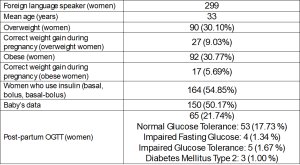The pregnancy and the postpartum period represent critical windows to initiate targeted interventions to improve metabolic health for both the mother and the child. The correct weight gain during gestation and the weight loss during breastfeeding have the same impact on the mother and can reduce the complications related to gestational diabetes mellitus (GDM). The development of a multi-ethnic society poses an ever-new challenge for the diabetologist dealing with GDM, in fact, the presence of language barriers and dietary habits far from the “Mediterranean diet” are factors that can influence the diagnostic and therapeutic pathway, effectively making some patients more vulnerable to an improper management of the disease. We have retrospectively analyzed the electronical medical records of pregnancies actively followed at the third-level diabetology Centre of the Hospital of Perugia, Italy from the First of January 2020 to the first of March 2024. Of these 845 pregnant, 546 were native Italian speakers while 299 (35.38%) were foreign language speakers or had dietary habits distant from the Mediterranean diet. Of these 299 women, we calculate the Body-Mass-Index (BMI) before and at the end of the pregnancy, to define the class of weight and the weight gain during the pregnancy (Tab. 1). We also checked the adherence to an active follow-up with the Oral Glucose Tolerance Test (OGTT) 2-3 months after childbirth. Interestingly 19 women have more than one pregnancy during the evaluation time and interestingly 6 of them have a significantly higher BMI in the second pregnancy. As further classification, we have decided to use the nationality rather than the ethnicity of the women because of the different diets in the same ethnic group that can influence the outcome and the correct management of the pregnancy. This retrospective study shows how increasingly heterogeneous is becoming the population who develop gestational diabetes mellitus. The language barrier, different eating habits and generally the difficulty of accessing an outpatient visit make the women foreign language speakers a “high-risk class” with a strong likelihood of developing problems during and after the pregnancy complicated by GDM.


